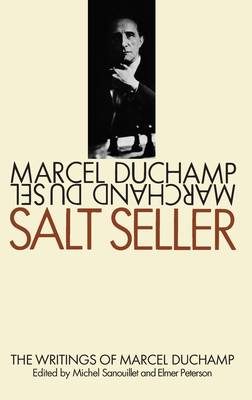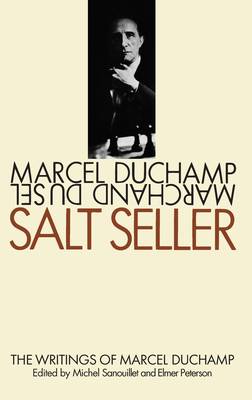
Door een staking bij bpost kan je online bestelling op dit moment iets langer onderweg zijn dan voorzien. Dringend iets nodig? Onze winkels ontvangen jou met open armen!
- Afhalen na 1 uur in een winkel met voorraad
- Gratis thuislevering in België vanaf € 30
- Ruim aanbod met 7 miljoen producten
Door een staking bij bpost kan je online bestelling op dit moment iets langer onderweg zijn dan voorzien. Dringend iets nodig? Onze winkels ontvangen jou met open armen!
- Afhalen na 1 uur in een winkel met voorraad
- Gratis thuislevering in België vanaf € 30
- Ruim aanbod met 7 miljoen producten
Zoeken
Omschrijving
Nude Descending a Staircase is one of the best known works of art in tihs century. It caused a sensation at the historic Armory Show of 1913, being damned by one critic as "an explosion in a shingle factory." Yet the criticism in no way perturbed it imperturable creator, Marcel Duchamp. Duchamp's "readymades" (the urinal singed by R. Mutt and entitled Fountain, the snow shovel entitled In Advance of the Broken Arm, and other objects bought and exhibits as works of art) are by now familiar objecs of critical derision and delight. And Duchamp's influence has been pervasive throughout modern art, fosterin Neo-Dada, Op Art, Pop Art, and Conceptual Art. Marcel Duchamp's major work, The Bride Stripped Bare by her Bachelors, Even (also known as The Large Glass) was left in a state of "definitive incompletion" in 1923. The notes for this extradordinarywork form the largest part of SALT SELLER. Duchamp collected many of them for his Green Box in 1934, when their publication was immediately hailed by Andre Breton as a major intellectual event. The notes themselves will help the curious but mystified spectator of The Large Glass in no simple or straighforward way. They do, however, demonstrate wht an extraordinarily original process the making of The Bride Stripped Barde by Her Bachelors, Even was. Duchamp's wit is nowhere in greater evidence than in the section "Rrose Selavy & Co." Duchamp was photographed in women's apparel by Man Ray and created a "readymade" female alter-ego Rrose Selavy ("Eros c'est la vie" or "arroser la vie" - drink it up; celebrate life). Rrose printed a calling card and her company advertised -- "For practical wear, a Rrose Selavy creation: The oblong cress, designed exclusively for ladies afflicted with hiccups." The company also had a service department which made "...home deliveries: domestic mosquitoes (half stock.)" The surrealists had proclaimed in the twenties that words were no longer playing around but had started making clove. This description seems to fit the sayings of Rrose Selavy who fashioned some of the most joyour and ingenious couplings and uncouplings in modern literautre.' In the section "Marcel Duchamp, Criticavit", the more serious side of Duchamp is represented by two informative interviews and two important statements on art, "The Creative Act" and "Apropos of Readymades." His more experimental writings are grouped under the title "Texticles." Taken together these varied writings constitute a major document of modern art. Whether the reader sits back and enjoys the charms of Duchamp or studies and attempts to decipher his inner-most secrets, the reader will find SALT SELLAR a compendium of delight.
Specificaties
Betrokkenen
- Auteur(s):
- Uitgeverij:
Inhoud
- Aantal bladzijden:
- 210
- Taal:
- Engels
Eigenschappen
- Productcode (EAN):
- 9780197641125
- Verschijningsdatum:
- 1/09/2023
- Uitvoering:
- Hardcover
- Formaat:
- Genaaid
- Afmetingen:
- 156 mm x 234 mm
- Gewicht:
- 503 g

Alleen bij Standaard Boekhandel
+ 100 punten op je klantenkaart van Standaard Boekhandel
Beoordelingen
We publiceren alleen reviews die voldoen aan de voorwaarden voor reviews. Bekijk onze voorwaarden voor reviews.











